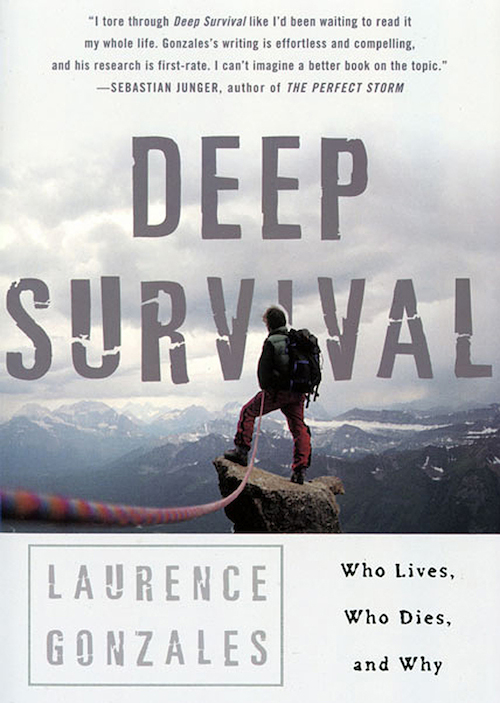 Deep Survival by Laurence Gonzales came out of left field for me (a referential analogy that I decidedly do not understand). I sometimes choose books off of the Personal MBA reading list, which is where I found this one. And since I typically don’t download samples, I was half way through the first chapter wondering if I’d made a mistake. I bought it because, as Josh Kauffman of the Personal MBA puts it, “If you want to really learn about a complex system like the human mind, study what happens when it’s pushed to the breaking point”. That’s good advice for understanding just about anything. Look at what happens when you put stress on it, and especially what has happened when it failed under that stress.
Deep Survival by Laurence Gonzales came out of left field for me (a referential analogy that I decidedly do not understand). I sometimes choose books off of the Personal MBA reading list, which is where I found this one. And since I typically don’t download samples, I was half way through the first chapter wondering if I’d made a mistake. I bought it because, as Josh Kauffman of the Personal MBA puts it, “If you want to really learn about a complex system like the human mind, study what happens when it’s pushed to the breaking point”. That’s good advice for understanding just about anything. Look at what happens when you put stress on it, and especially what has happened when it failed under that stress.
That’s what Gonzales’ book was about. The mechanism of human survival and what is happening in times of extreme stress and failure.
“These concepts, like this entire book, are not necessarily meant for the elite mountaineer, the fighter pilot, or the Olympic kayaker, who face death on their own terms. They are meant for the rest of us, who just want to get through life’s rough spots and go out now and then to see the beauty or to get a little adrenaline fix.”
That statement is a more accurate picture of the bulk of the book than the opening chapter or two might imply. Had I gotten the sample, I wouldn’t have read this awesome book. I mean, not like… the Grand Canyon or Niagra Falls is awesome. But, still pretty cool.
The first chapter lays the foundation of our emotional/rational brains. Emotion naturally trumps reason, but reason is capable of taking the reins. He describes the relationship between reason and emotion with the metaphor of jockey and a horse.
“The human organism, then, is like a jockey on a thoroughbred in the gate. He’s a small man and it’s a big horse, and if it decides to get excited in that small metal cage, the jockey is going to get mangled, possibly killed. So he takes great care to be gentle. The jockey is reason and the horse is emotion, a complex of systems bred over eons of evolution and shaped by experience, which exist for your survival. They are so powerful , they can make you do things you’d never think to do, and they can allow you to do things you’d never believe yourself capable of doing. The jockey can’t win without the horse, and the horse can’t race alone. In the gate , they are two, and it’s dangerous. But when they run, they are one, and it’s positively godly.”
In the coming chapters, he presents the interesting concept of “somatic markers“. It is theorized that somatic markers can help the mind make decisions when the minds cognitive abilities are overloaded. Simply said, these “bookmarks”, as Gonzales calls them, are why we might rush to jump on a roller coaster, or a water slide. We received a reward in the way of “fun” last time when we did this thing, and the experience is bookmarked. “Going fast on a roller coaster is fun”. Bookmarks also help us learn not to touch hot things with our bare hands. It works for us much of the time. But it can be deceiving, too. For example, the person with a bookmark that says “roller coasters are fun”, without any bookmark telling them “sometimes people fly off of them and die”, might follow that bookmark and likely ignore the roller coaster’s obvious state of disrepair. Then they might die, and then their survival would be very shallow indeed.
Gonzales continues on into detail about how how brain maps the world around us, and as an extension, what it means for people to be “lost”. It’s a common theme throughout the book. There’s more research on the subject than one might expect without giving it real thought. Gonzales points out a child’s response to the question of whether they are lost. They might say, “No I’m right here. Mommy is lost.”
The central idea is that the concept of “lost” is a relative thing. It’s about being able to get from one unknown location to another unknown location. The funny thing about being lost, it seems, is that it comes about from a combination of ego, loss aversion, and the emotional build up of anxiety from disorientation. First we deny we’re lost. Then we don’t want to turn back on the path we still know because it feels so much like losing ground, and then we panic desperately trying to correct our lostness, but in the process generally lose the chance to backtrack along the steps we knew. In the end, Gonzales says we need to “be here now”, much like the child. We’re not lost, we’re right here. We have to make our location relative to right where we are and begin surviving right there.
That’s good advice for any part of life.
Chapter four talks about how emotional content in our experiences helps them to develop into longterm memories. While content devoid of emotion is hard won in the long term.
Later, Gonzales brings in the idea of normal accidents. Humans build systems to support and protect us, but any system that is complicated, and has an eventual weak point. He uses the example of a sand piling up. It appears orderly, and begins stacking to a certain height, but sooner or later, the grains of sand start to tumble to the side. Under the proper stress, any system will eventually suffer normal accidents where making the system more complicated would only increase the number of accidents. Again, another good point for life.
The second half of the book moves away from the conditions of an accident, and the circumstances around people surviving, and into the mind of someone surviving. It’s about how what happens inside that allows some people to walk away from disaster with their lives. Evidently, the chatter in your own head is likely to become quite and loud and further disorienting the plight of a person in a survival situation. The concept of prayer comes up as a manner of verbally announcing your needs. Whether you believe God is listening or not, “only when you are aware [of your needs] can you take action”.
Gonzales talks about how people who successfully survive eventually become okay with the idea that they will not survive before they find their way out or are rescued. The theory goes something like having nothing left to lose. Survival often takes on outrageously difficulty or risky tasks. Fear of death means fear doing what you might need to do to survive. He quips that survivors walk a line between knowing they are going to die, but being able to say “maybe not today”.
In the end of the book, Gonzales offers some practical advice for adventurers. It’s a welcome addition. If you read the book, don’t skip it. It’s in the appendix.
In Conclusion
I really enjoyed the book. I feel grateful that I do not have a drive to climb a mountain or sail across the ocean alone, but I also feel more prepared for something unlikely. If you enjoy adventuring, or are starting a business, or having a kid, Deep Survival is definitely a good primer for the hectic. It’s worth a read.

You’ve written a really thoughtful and insightful review of one of my favorite books. I only wish EVERY reviewer gave as much thought to what they took away from a book.
You hit the high points and emphasized the same lessons that struck me.
Well done!
Thanks! It’s been a while since reading, I should pick it up for a refresher! 🙂